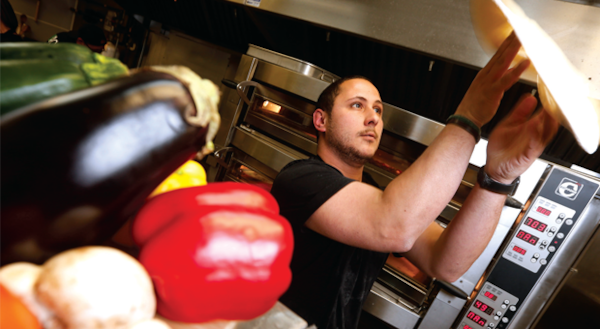
Giuliano Ghersevich, co-owner of Aurora Pizzeria and Café in Winnipeg, upholds tradition by using certified foods from Italy. “It makes me happy that people get to try authentic Italian products,” he says.
Little Italy neighbourhoods in major Canadian cities are home to a bounty of charming cafés and small Italian grocery stores. Mostly family run, these proud purveyors of authentic Italian food products frequently carry items with the European Union–approved seals of certification PDO (Protected Designation of Origin) and PGI (Protected Geographical Indication) – in Italian, DOP (Denominazione di Origine Protetta) and IGP (Indicazione Geografica Protetta), respectively. Here's a look at the history and continuing impact of Little Italy neighbourhoods in cities across the country.
TORONTO
College Street, between Bathurst and Ossington, has been known as the city's Little Italy since the 1920s. Along with Canada's first Italian-language radio station and the Italian Walk of Fame, which celebrates noteworthy Italian Canadians, the neighbourhood is filled with small Italian grocers, cafés and restaurants. Festival Fine Foods boasts a sizable selection of made-in-Italy pasta, olive oil and canned tomatoes such as Pomodoro S. Marzano dell'Agro Sarnese-Nocerino PDO; and nearby Grace Meat Market offers an assortment of fresh meats and Italian cheeses like Parmigiano Reggiano PDO. Farther west, The Sicilian Sidewalk Café is a neighbourhood institution that first opened its doors in 1959. "We use many authentic Italian products," says Maria Galipo, who is the CEO of the popular café as well as the well-known Sicilian Ice Cream Company. "Not only are they made from the finest ingredients in Italy, but they're also from a long history of traditional methods and trade secrets that have been passed down from one generation to another."
WINNIPEG
While the moniker "Little Italy" doesn't officially apply anymore to the area on and around Corydon Avenue, between Stafford Street and Pembina Highway, the neighbourhood still has plenty of nods to its Italian heritage. At Frescolio – a retail shop that operates like a tasting bar – gourmet olive oils and balsamic vinegars abound, and Aurora Pizzeria and Café offers Roman- and Neopolitan-style pizzas and pasta. "It makes me happy that people get to try authentic Italian products and get to know our traditions and kitchens," says Giuliano Ghersevich, co-owner of Aurora.
CALGARY
Italians first settled in the Bridgeland neighbourhood in Calgary in 1910. The community has since dispersed, but the legacy continues through the many local Italian shops and restaurants. Italian Super Market, which first opened its doors in 1963, specializes in imported Italian food products, including more than 250 varieties of pasta. Nearby is Lina's Italian Market, which purveys imported-from-Italy pasta, oils and balsamic vinegars such as Aceto Balsamico di Modena PGI. "The authenticity of the products helps people connect with the culture," says Ian Bunting, who manages the store. "PDO is a guarantee that the food was made by local farmers and artisans using traditional methods. It's important to us that Calgarians have a place to find items that carry this designation."
MONTREAL
Canada's first Little Italy was established in Montreal, where Italians started coming in 1880, congregating in the Centre-Sud neighbourhood. The community has since moved west to Rosemont–La Petite-Patrie. The city's famed Jean-Talon Market is a hub for the area and home to many Italian grocers, shops and eateries. Among the almost three dozen food shops is Milano Fruiterie, which has been offering Italian gastronomy to locals for 60 years. Mario Zaurrini, who is part of the second generation of the family now running this store, notes that it was the first in the city to carry rapini and Italian parsley. Today the shop sells a full selection of groceries and stocks made-in-Italy goods such as panettone, biscotti, coffee and preserves.
VANCOUVER
The Italian presence in Vancouver dates back to 1836. The newly dubbed Little Italy, a portion of Commercial Drive north and south of East 1st Avenue, has been home to Italians here since the 1940s. Every year, it hosts Italian Day, a street festival celebrating Italian heritage and culture. La Grotta del Formaggio may be a small grocer, but its selection of Italian food – pastas, cheeses, and authentic Olio Extravergine di Oliva Umbria PDO – is impressive. If you want to leave the cooking to someone else, Federico's Supper Club will sate your appetite with well-executed traditional Italian dishes with modern twists, from antipasti of the day to tiramisu. Owner Federico Fuoco proudly uses authentic Italian products in his kitchen. "When you do side-by-side comparisons, the ones that are grown in the specific native areas of Italy are always the best," he says.
For more information about authentic Italian food, visit italianmade.com.
This content was produced by The Globe and Mail's Globe Edge Content Studio, in consultation with an advertiser. The Globe's editorial department was not involved in its creation.